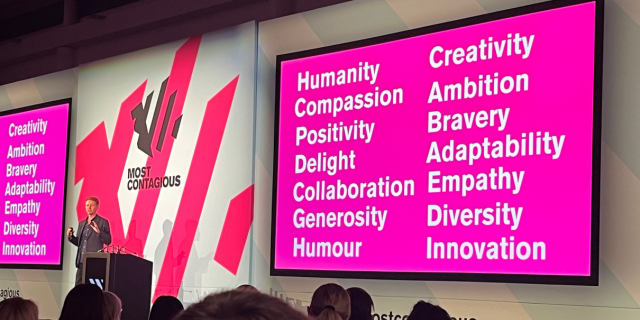Get analysis, insight & opinions from the world's top marketers.
Sign up to our newsletter.
This year’s Most Contagious highlighted the need for empathy combined with data and insights to create impactful and award-winning campaigns that’s good for business and people. WFA’s Senior Communications Manager Laura Baeyens shares her top three takeouts from the conference.
One of the most memorable soundbites I heard from Most Contagious 2023 in London earlier this month was from marketing professor Marcus Collins: “We as marketers suck at identifying people because we put them in a box, not because it’s accurate but because it’s easy”. As Beyoncé’s former digital strategist, I think he knows a thing or two about how important it is for marketers to engage with consumers in a meaningful and authentic way, especially in the current climate.
But short-termism and shiny object syndrome are still commonplace in the industry. Marketers are missing out on the opportunity to connect with the people their brands serve in a more human way.
Despite this, it is important to look at the positive and celebrate work grounded on human truths. 2023 saw brilliant marketers and creatives come out with stand-out campaigns that have thoughtfully embraced culture and the simple reality that “people buy from people”. Here are my takeaways on some of these campaigns featured on the Most Contagious stage:
Culture is “the biggest cheat code” of marketers because “consumption at its core is a cultural act”, according to Professor Collins. And the language we use to define and interpret culture, based on data and insights, can make or break a campaign.
Mastercard’s ‘Where to Settle’, which help people who have fled the war in Ukraine find housing and employment in Poland through job and real estate data and spending insights, is a brilliant example of how the language you use can have a positive impact on society. Mastercard, through this purpose-driven campaign around economic inclusion, looked to change the narrative around refugees by shifting the language. “What if we see them as a doctor, a developer, a teacher, instead of a refugee?”. They have helped over 20% of the 1.5 million Ukrainian refugees settle in Poland and took home this year's Cannes Lions Titanium and Sustainable Development Goals Grand Prix.
Embracing the more non-verbal power of language is McDonald’s ‘Raise Your Arches’ campaign which unapologetically embraced branding and loving your brand. To break free from the usual creative that has not been really connecting with people emotionally, they took some time to reflect and figured out through eight months of observation (ethnography) that people wanted a McDonald’s food item the most when they are presented with the option and not when they are eating it, a.k.a. the unsaid suggestion or “f*ck it” moment through raising your eyebrows, which happens to mirror McDonald’s iconic arches.
Professor Collins emphasised that marketers love being in the middle. “But the middle is noisy, it’s hard to differentiate.” This entails not sticking to what is “normal” in culture and having the bravery to say no, which is a very human thing to do.
Take Fiat’s ‘Operation No Grey' ad which broke every marketing rule for a car brand, dipping their CEO and one if its cars in a large vat of orange paint. Embracing the “why not?” instead of the “why?”, Fiat revisited its Italian roots and the brand’s ‘Dolce Vita’ value, which means saying no to the most popular car colour for good – grey. Francesco Martini from Leo Burnett Italy echoed a human truth during the conference: “as children when we reclaim our identity, we don’t say yes; we say no”. It was a matter of embracing the philosophy of subcultures like punk: “if people start to build fences around you, break out and do something else”. Deemed as the company’s “best-ever” ad, it’s in the top 5% for all UK car ads according to System1 and was even praised by Mark Ritson for its brand building and differentiation.
“We have to sit in many seats” for marketers to truly understand people, according to Professor Collins, which means embracing intersectionality for brands to be and stay culturally relevant. And the biggest keyword here is empathy. With all the talk around the opportunities and risks of generative AI for brands, everyone can agree that the human element in marketing must endure.
Dove’s ‘Cost of Beauty’ is a brilliant example of empathy in action and how brands need to move with the speed of culture to drive growth for the business while also bring about positive change in society. The campaign solidifies the brand’s purpose to redefine beauty standards and addresses toxic beauty in a very poignant way, sharing stories of young people impacted by appearance hate and discrimination on social media, which Dove dubbed a “silent public health crisis”. They started with data and insights on how prevalent the issue is and talking to women and girls who have gone through it. “It is authenticity, backed by data and a true understanding of the challenge, backed by action.”
Mattel’s Chief Brand Officer, Lisa McKnight, spoke about Barbie’s comeback after being seen as outdated and portraying unrealistic beauty for young people. The iconic doll’s success, including through its diverse doll line and most recently the Barbie movie, is a combination of purpose (to empower girls) and cultural relevance, connecting with pop culture to broaden Barbie’s human appeal and amplify engagement among fans and non-fans alike.

According to Tom Standage and The Economist’s The World Ahead, 2024 will see geopolitical tensions loom in different parts of the world amid a record number of countries having their national elections in the coming year. In times of greater polarization, we as an industry need to promote empathy. With all the doom and gloom, let’s keep the faith in humanity, including in our marketing.